Police Officer Resignation Letter Samples
-
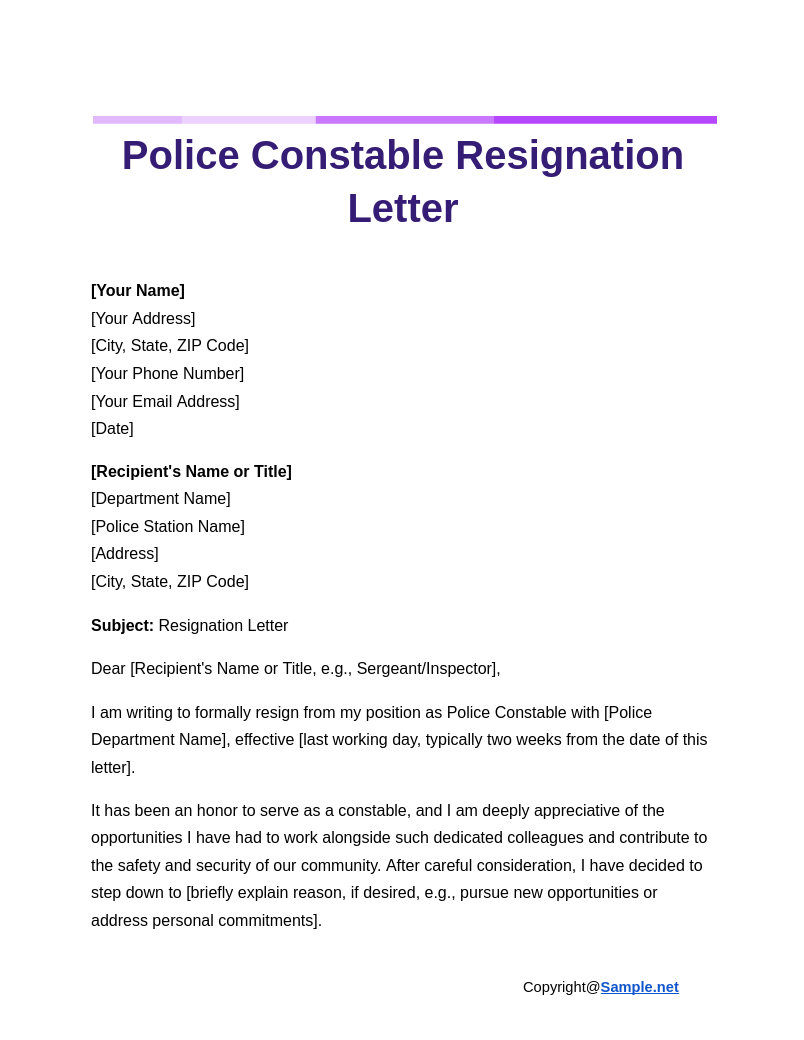
Police Constable Resignation Letter
download now -
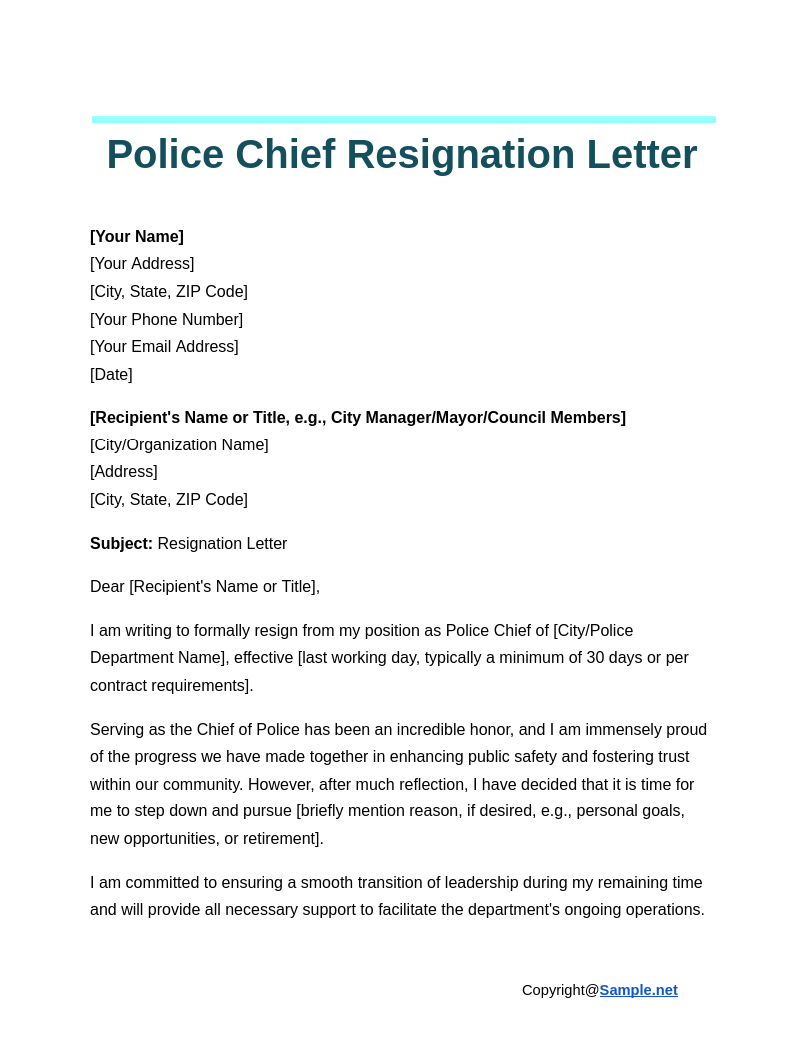
Police Chief Resignation Letter
download now -
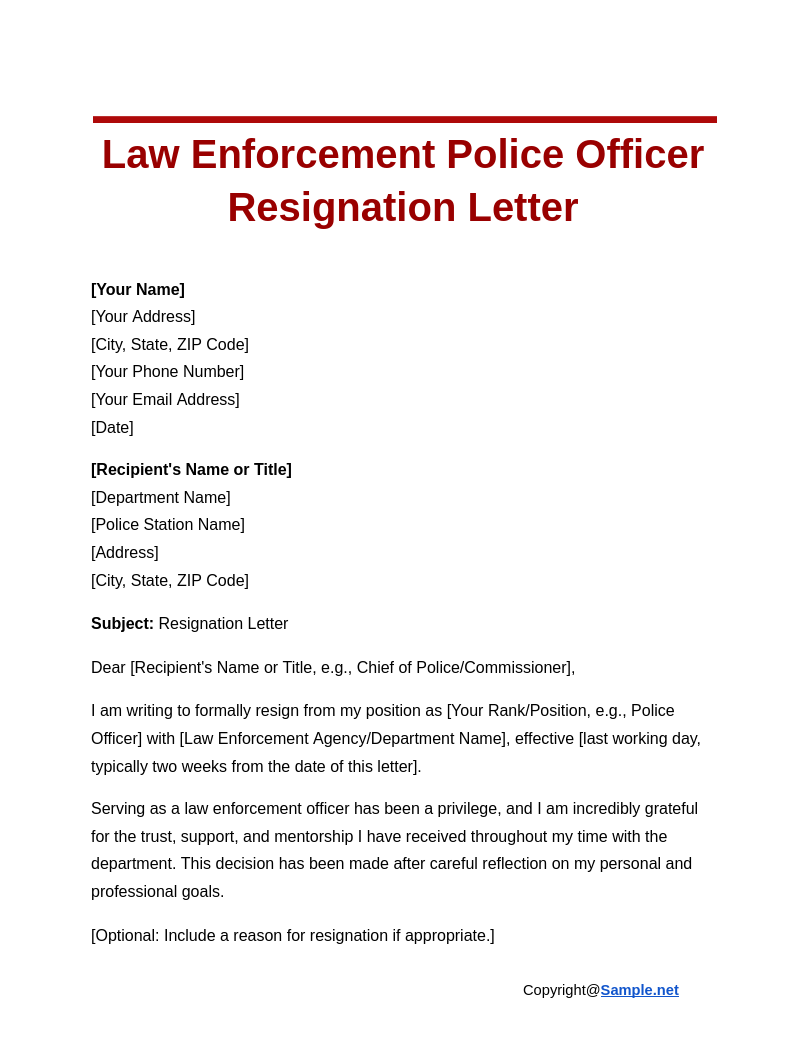
Law Enforcement Police Officer Resignation Letter
download now -
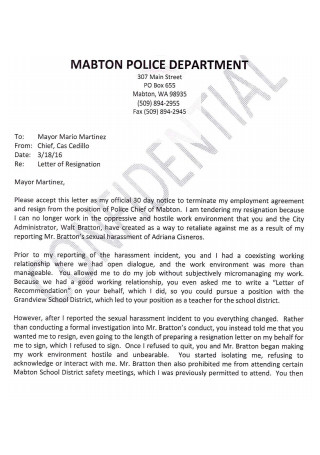
Resignation Letter from Police Mayor
download now -
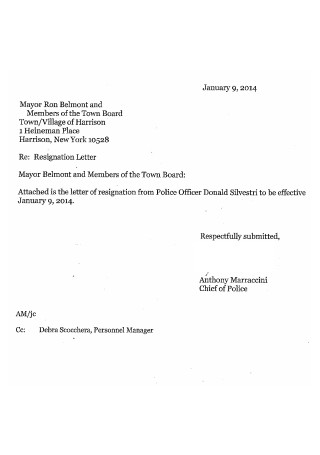
Letter of Resignation from Police
download now -
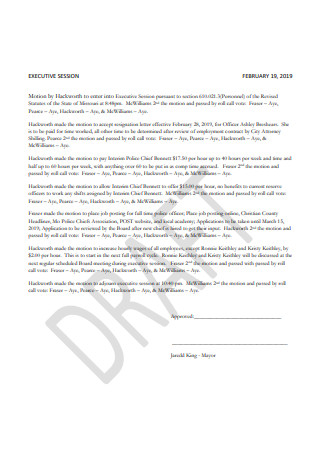
Sample Resignation Letter of Police
download now -
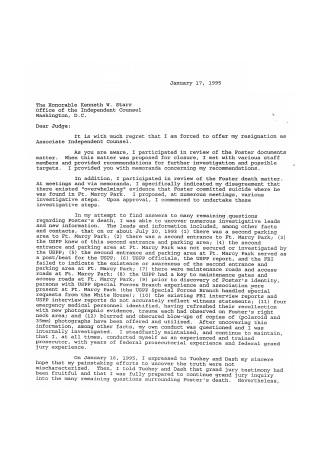
Resignation Letter from Independent Counsel
download now -
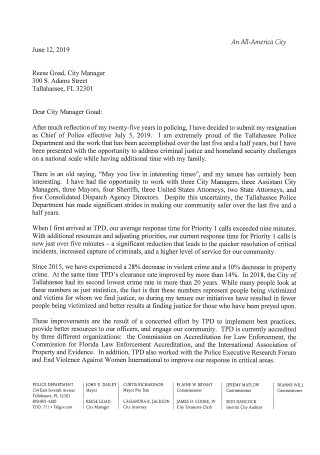
Police Resignation Letter
download now -
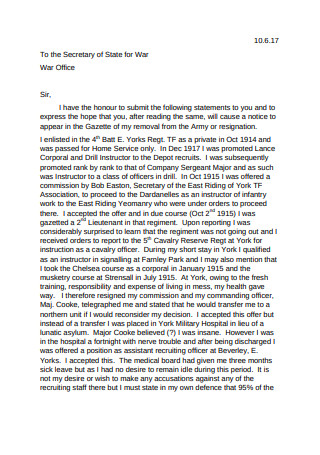
Resignation Letter from Lt. Army
download now -
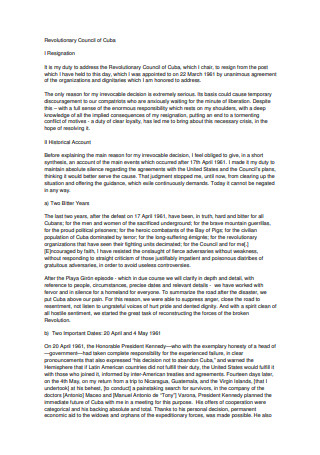
Resignation Letter of Police Officer
download now -
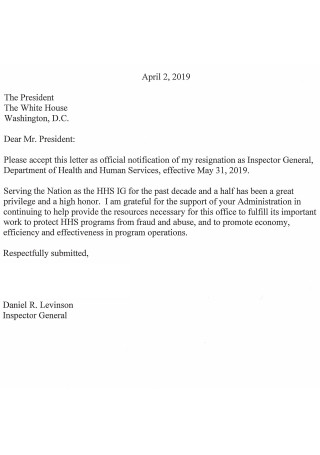
Resignation Letter of Inspector General
download now -
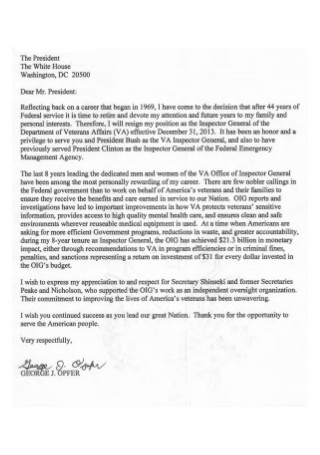
Inspector General Resignation Letter
download now -
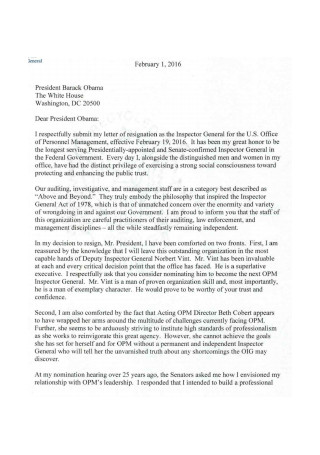
Resignation Letter to President
download now -
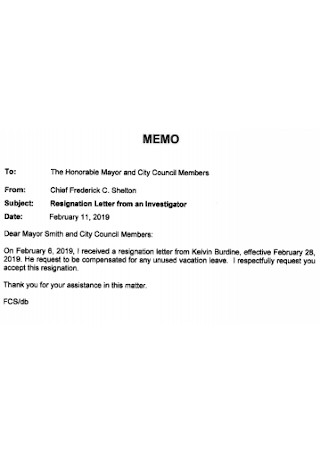
Resignation Letter from Investigator
download now -
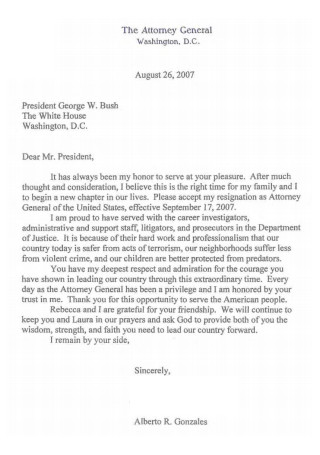
Attorney General Resignation Letter
download now -
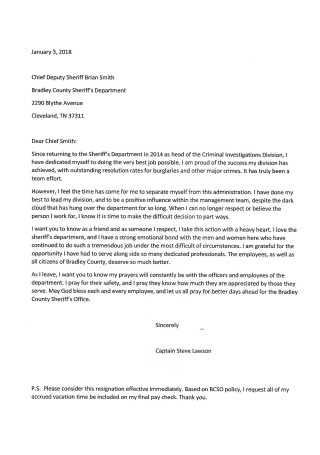
Resignation Letter from Investigation Officer
download now -
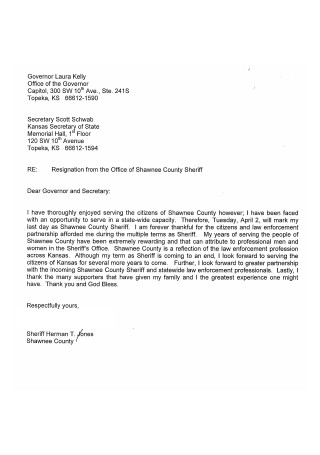
Resignation Letter of Shawnee County Officer
download now -
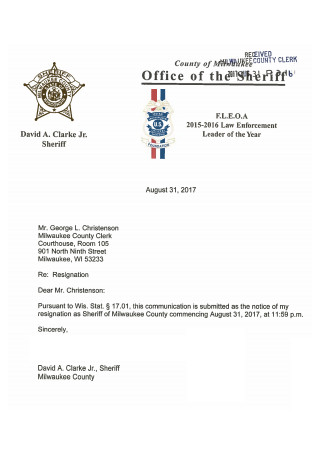
Sheriff’s Officer Resignation Letter
download now -
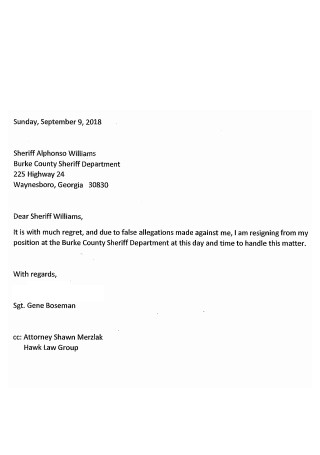
Officer Resignation Letter to Attorney
download now -
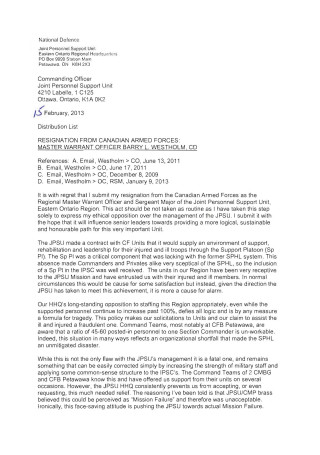
Letter of Resignation from Armed Force
download now -
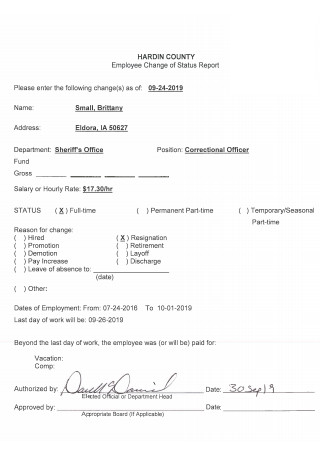
Police Officer Resignation Letter Form
download now -
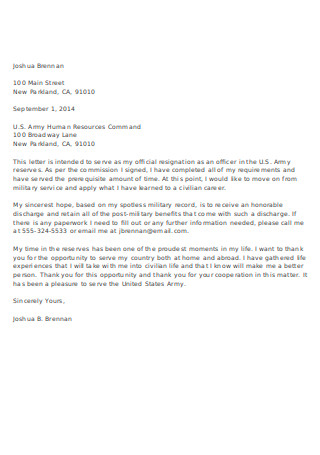
Military Army Officer Resignation Letter Sample
download now -
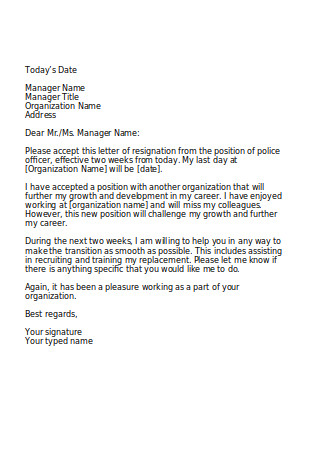
Police Officer Resignation Letter to Manager
download now -
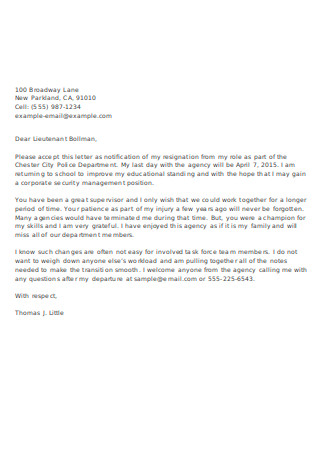
Police Officer Resignation Notice Letter
download now
FREE Police Officer Resignation Letter s to Download
Police Officer Resignation Letter Format
Police Officer Resignation Letter Samples
What Is a Police Officer Resignation Letter?
The Types of Resignation Letters
How to Write a Police Officer Resignation Letter
FAQS
Why is a resignation letter important for police officers?
How much notice should I give in my resignation letter?
What should I include in the resignation letter?
How can I ensure my resignation letter leaves a good impression?
What happens after I submit my resignation letter?
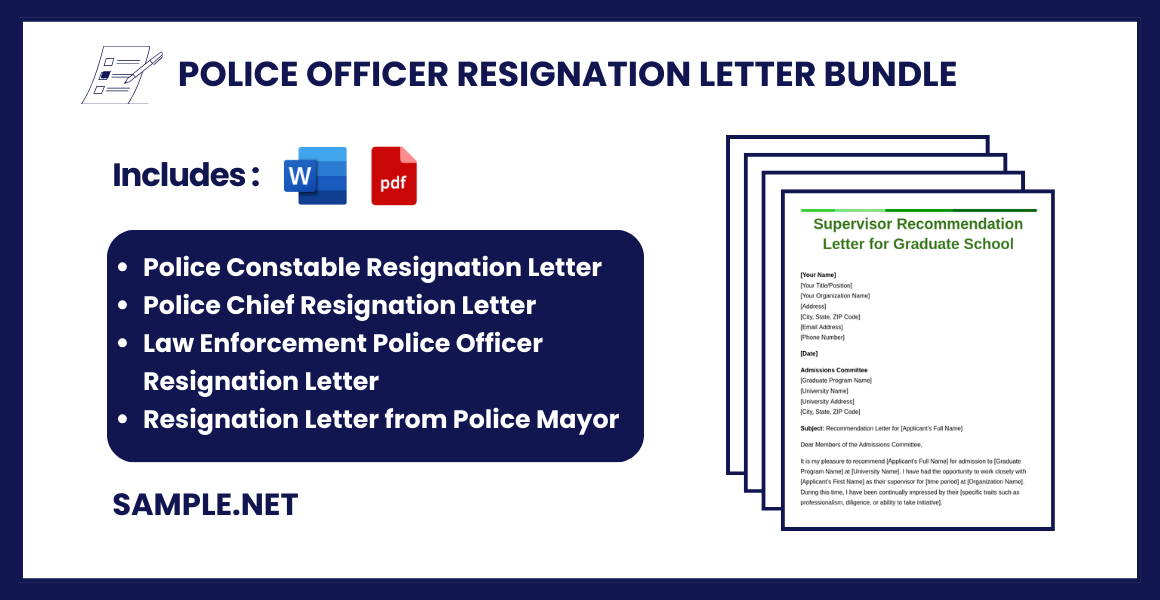
Download Police Officer Resignation Letter Bundle
Police Officer Resignation Letter Format
[Your Name]
[Your Address]
[City, State, ZIP Code]
[Your Phone Number]
[Your Email Address]
[Date]
[Recipient’s Name or Title]
[Department Name]
[Police Station Name]
[Address]
[City, State, ZIP Code]
Subject: Resignation Letter
Dear [Recipient’s Name or Title, e.g., Chief of Police/Commissioner],
I am writing to formally resign from my position as [Your Rank/Position, e.g., Police Officer] with [Police Department/Station Name], effective [last working day, typically two weeks from the date of this letter].
This decision was not made lightly, and it comes after thorough consideration of my personal and professional aspirations. Serving as a police officer has been an honor, and I am deeply grateful for the opportunities I have had to contribute to our community’s safety and welfare.
[Optional: Provide a reason for resigning, such as career advancement, personal commitments, or health reasons, if desired.]
I want to express my sincere gratitude to you, my colleagues, and the department for the guidance, support, and camaraderie I have experienced throughout my tenure. The skills and values I have gained during my service will continue to guide me in my future endeavors.
I am committed to ensuring a smooth transition and am willing to assist in any way necessary during my remaining time with the department. Please let me know if there are specific tasks or responsibilities you would like me to address before my departure.
Thank you once again for the opportunity to serve in this role. I wish the department continued success in its mission to serve and protect our community.
Sincerely,
[Your Full Name]
[Your Badge Number, if applicable]
[Your Signature, if submitting a hard copy]
What Is a Police Officer Resignation Letter?
A police officer resignation letter is the document written by someone who wants to make his or her intentions of leaving the police force clear. It contains many of the same elements as nurses, engineers, or teacher resignation letter, such as the specific reasons for resignation, the number of days to be rendered until the last day, and others. Once this is submitted by the police officer to his or her superior, it takes a legal effect that results in the termination of its author’s employment status. Multiple contractual appointments can be rendered terminal with the use of unilateral notices or even the advanced notice of a specific period of time, regardless of any further conditions.
According to the Bureau of Labor Statistics, “on average, 115 police and sheriff’s patrol officers suffered fatal work injuries each year from 2003 to 2014.”
According to Sage Journals, “the (national) turnover rate was 10.8% in both 2003 and 2008 (in the United States). Turnover rates, however, were higher in smaller agencies, municipal agencies, those in southern regions, and those in rural areas.”
The Types of Resignation Letters
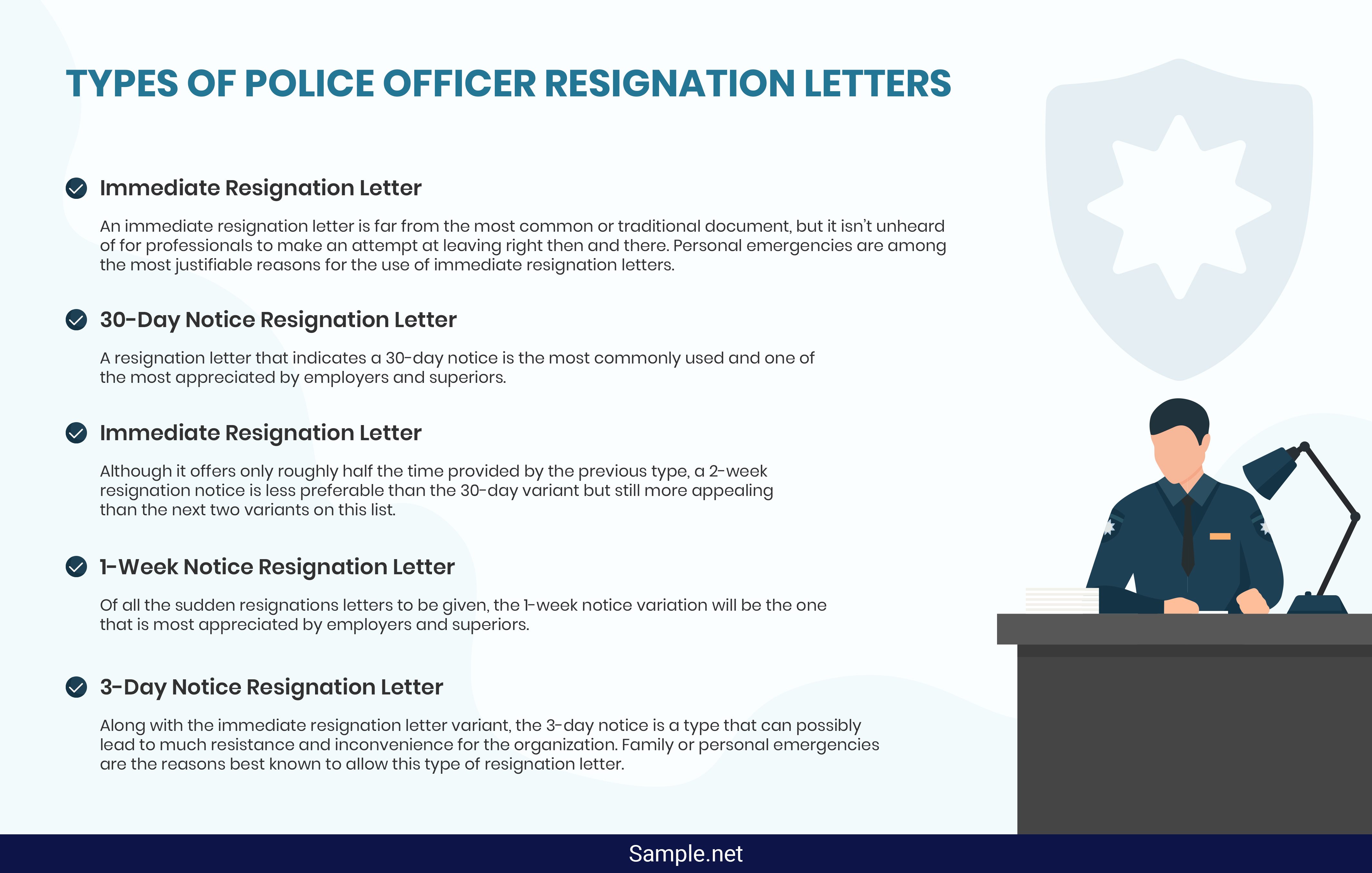
When it concerns the type of Official letters of resignation that you want or need, the varieties are primarily focused on the specific period of time in the notices. Below is the list of the types and a short description for each one.
How to Write a Police Officer Resignation Letter
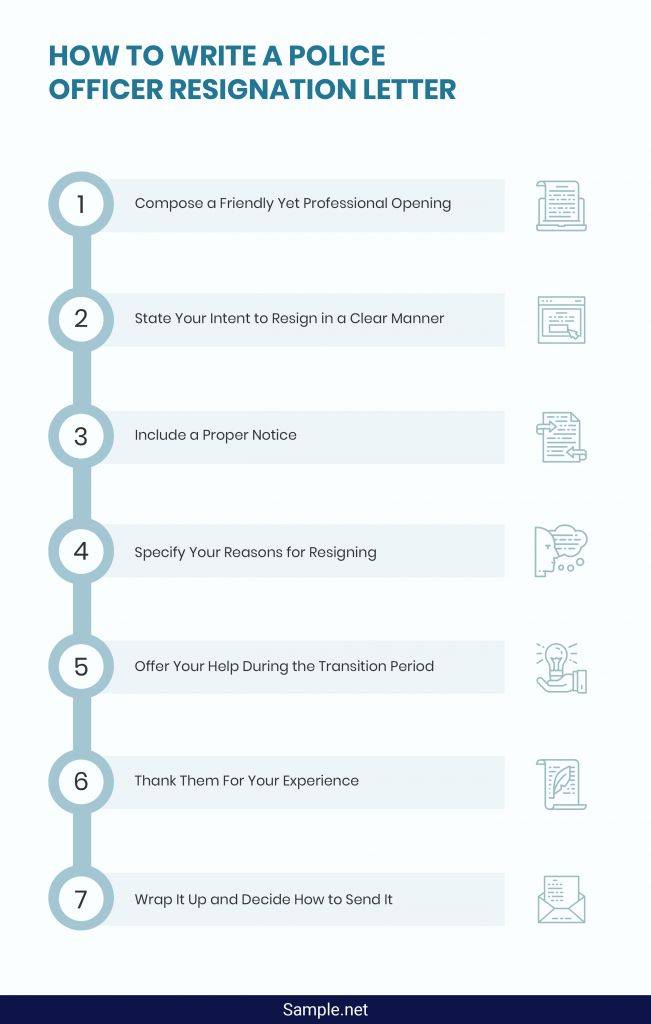
There will come a time when you need to move on from your present position and leave for the next one. When that time comes, you need to learn how to write your short resignation letter notice and kick your departure off in the right way. This is for those who have yet to experience resigning from their jobs, so follow each step of this general set of instructions closely and you will find the experience to be much faster and easier than you might have expected.
Step 1: Compose a Friendly Yet Professional Opening
Before you get started, let us first acknowledge the fact that this is still considered a professional document. That should be enough to tell you that you can’t be too casual with your tone and it must be handled with grace and class as befitting of your position. Next, ensure that your opening paragraph comes off as friendly as possible. Address your direct superior or employer directly and don’t include any titles unless there is a genuine need for it.
Step 2: State Your Intent to Resignation in a Clear Manner
The next step is to get right down to the chase and let the recipient know that you are resigning. Leaving a job that depends on you greatly is never an easy thing to do and neither is leaving a workplace where you have fostered so many positive relationships. However, the entire point of this letter is to inform your employer that you are leaving and it must be stated as clearly as possible. You don’t want them thinking that this is just a temporary leave of absence or that you will be back soon. Do not mince words and state your intent directly. You can also see more on Standard Job Resignation Letter.
Step 3: Include a Proper Notice
The reasons for your resignation is going to influence how you handle this next step. Regardless of how much time you will volunteer to stay with the company until your last day, it is best to specify and not be vague about anything. Most people in any given position are known to render at least thirty more days to help smoothen the transition process. However, there may be more urgent reasons for the resignation, which is why it is not unheard of for some employees to provide a two-week notice, a notice of just a few days, or even immediate resignation.
Step 4: Specify Your Reasons for Resigning
From there, follow it up with your reason for doing so. Take note that this is something that should be handled delicately. Although the overall tone of your letter should be direct and specific, it pays to frame your reason in a way that is not offensive — in the event that it is negative — while remaining as clear and specific as possible to avoid misunderstandings. For various reasons, an amicable departure is always wise to achieve whenever possible and how you handle your reasoning can play a big role in it.
Step 5: Offer Your Help During The Transition Period
Towards the end of writing the letter, acknowledge that your departure may put the company or organization in a tight spot. Offer to help them out during your last remaining days as a gesture of goodwill and continued cooperation until the very end. Although you do not have to specify what you are willing to do, this will most likely entail training your successor, turning over any equipment or important files over to management, and a few others. Regardless of what it is, show your enthusiasm to remain a team player throughout your last days. You can also see more on Employee Resignation Letter.
Step 6: Thank Them For Your Experience
Whether your overall experience with the company you intend to leave was good or bad, it is still the right move to thank your superiors for the time you spent with them. Learning should be a continuous thing and there is no doubt that you learned multiple lessons during your tenure. Employers will also greatly appreciate reading about how your time with them has enabled you to grow both personally and professionally, so don’t hesitate to express your gratitude.
Step 7: Wrap It Up and Decide How to Send It
The last step involves your concluding remarks. If you decide to print this out in order to hand it over in person, then affix your signature on it. Otherwise, you may simply send it digitally as an email resignation letter. Before doing either of those, re-read what you’ve written and checked for any errors. You can even rewrite it and come up with as many drafts as possible until you are completely satisfied.
A well-written police officer resignation letter reflects the professionalism and dedication of an officer even as they leave their position. It ensures a smooth transition for the department and maintains a positive relationship for future opportunities. Following the proper structure and tone while tailoring the letter to your specific situation is key to crafting a respectful resignation letter. You can also see more on Board Resignation Letter.
FAQS
Why is a resignation letter important for police officers?
It formally notifies the department, documents the resignation, and maintains professionalism for future references.
How much notice should I give in my resignation letter?
The standard notice period is two weeks, but it can vary depending on department policies or specific circumstances. You can also see more on Church Resignation Letters.
What should I include in the resignation letter?
Include your intent to resign, the effective date, expressions of gratitude, and an offer to assist during the transition.
How can I ensure my resignation letter leaves a good impression?
Focus on gratitude, professionalism, and a willingness to assist during the transition. Avoid negative comments or grievances.
What happens after I submit my resignation letter?
Once submitted, your resignation will be reviewed by the department. You may need to attend an exit interview or complete clearance formalities. You can also see more on Formal Letter.
